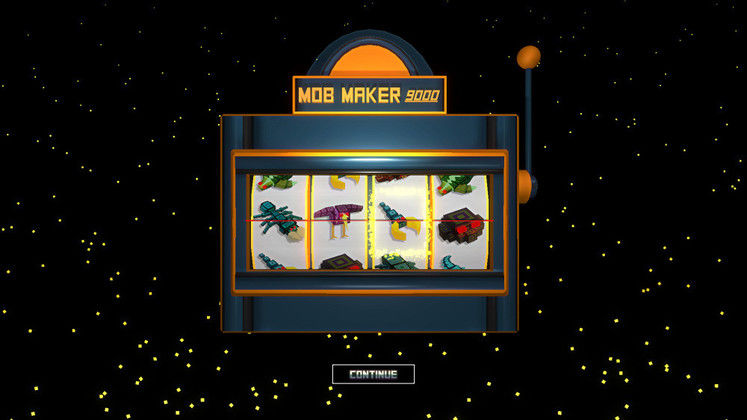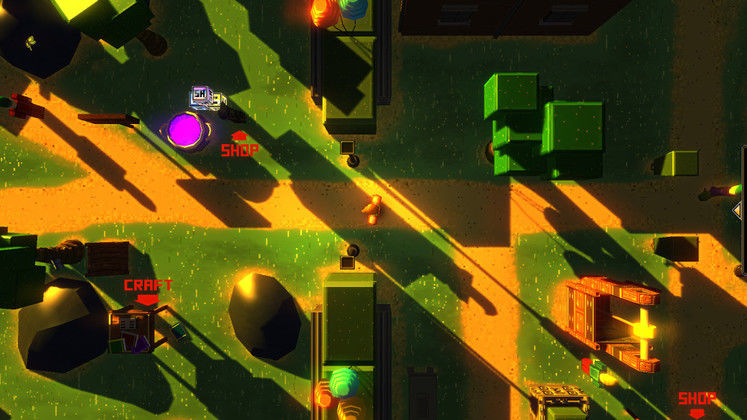Pixel Boy is – as its website pithily declares – a dungeon crawling top down action shooter. Thrust into the shoes of a bequiffed explorer, you’re tasked with guiding the titular hero through a series of procedurally generated dungeons replete with the usual menagerie of monsters.
 |
| It’s easy to trapped in a corner when you’re getting chased by a large mob |
Passage through the game’s four dungeons is achieved by locating the three constituent parts (red, green, blue) of a master key, which are dispersed randomly throughout its labyrinthine structure. Inevitably, your progress is thwarted by the creepy crawlies that roam the corridors – which is where Pixel Boy’s much-vaunted combat system comes into play.
Pixel Boy’s defining feature is a weapon customisation system that boasts over 6000 unique combinations. The protagonist’s basic attack can be augmented by a panoply of power-ups that are dropped by enemies, sealed in chests and bought at vendors.
In an intriguing twist to the formula, however, these power-ups can be stacked to produce a cumulative effect. For example, the Spread Shot, Heat-Seeker and Slow perks coalesce to form three streams of homing pixels that retard the movement of any creature they collide with.
You can combine up to three of these power-ups and there’s definitely fun to be had exploring the various permutations. A handful of these, like the Splitting Pixel that fragments your bullets into two, are amusingly counter-intuitive. Yet discovering what does and doesn’t work through trial and error is part of the appeal.
Similarly, armour can be smelted using collectible elemental orbs. Each element corresponds to a certain stat (fire rate, damage, speed, range and health), meaning you can manipulate your character’s base stats to match your play style – negating the need for class archetypes.
Further to this rudimentary crafting component, you can alchemise three power-ups (for a fee) into a single one – in effect, allowing you to equip nine power-ups at once if you fill your allotted slots with these engineered variants.
Obviously, this leads to some devastatingly effective concoctions but there is a downside. Because all these power-ups have a finite number of charges (250), you’ll be burning through your arsenal three times as quickly. Since they’re infrequently dropped by mobs and will set you back a fair wedge at the shop, it’s usually ill-advised to espouse this all-in tactic.
On that note, Pixel Boy’s miserly approach with regards to power-ups is one of its biggest flaws. In an attempt to adopt some of the roguelike genre’s more challenging tropes, the difficulty level has been pitched all wrong.
 |
| Before each level you spin the Mob Maker to determine which monsters will populate the dungeon |
Upon meeting your maker in Pixel Boy you lose all your accrued power-ups and the experience gained during that specific dungeon run but retain your coins and armour orbs.
Should you have amassed a small fortune in your previous escapade, then brilliant; swing by one of Resolutia’s merchants and purchase some items to give yourself a fighting chance the next time out. Find yourself penniless, however, and be prepared to ward off hordes of fluorescent scorpions with nought but your bog-standard peashooter.
In the early stages, this is manageable – losing your inventory is tough, but through clever kiting of enemies you can ease towards the objective. In the latter stages, though, you’ll find yourself woefully ill-equipped and vulnerable. This cycle continues until you either triumph in the war of attrition or accumulate sufficient currency to expedite the next run. And therein lies the problem.
There’s nothing inherently wrong with a game being challenging (the burgeoning popularity of roguelike titles is testament to this fact) but there’s a skill in knowing how to scale the difficulty without punishing the player unduly.
Pixel Boy fails in this respect, forcing you to repeat sections with a reduced repertoire at your disposal. And when the combat itself is so simplistic (you simply hold the left mouse button down while sidestepping incoming pixels), the motivation to push through a sticky patch diminishes very quickly.
In fairness, Pixel Boy provides entertainment in bursts. Learning the unique behavioural patterns of each monster type and adapting your power-up selections to counter them is a gratifying dynamic. Moreover, boss battles at the end of each set of levels introduce a welcome ramp up in combat complexity. It’s just a shame that this initial excitement wears off before long and what you’re left with is a relatively threadbare experience.
To compound the issue, each level, bar a few superficial graphical flourishes, plays exactly the same. Unless you enjoy trawling through a series of nondescript rooms to level up your character, you’re given little incentive to explore the dungeons beyond the point when you acquire the key. In fact, there are times when the key pieces are distributed in such a way that you’ll barely traverse 20% of the map.
 |
| Pixel Boy’s home town, Resolutia |
This lack of character permeates throughout but is most evident in the games’ central hub, where you’ll return periodically to replenish supplies and craft armour. The town of Resolutia, despite its vivid geometric aesthetic, is an uninviting and cold space, in which its blocky denizens serve only as placeholders, devoid of any identity or narrative purpose. Granted, Pixel Boy’s premise is hardly conducive to a rich backstory and mythology, but there’s really no personality here to lure you back in.
To afford credit where it’s due, the developers did come up trumps on the audio front, hiring French electronica artist Pyramid to compose the game’s ambient soundtrack, which does a stellar job of conveying the trepidation of adventuring. It’s a shame then that I can’t recommend Pixel Boy because there are some neat touches – they’re just dwarfed by a few cripplingly bad ones.
PIXEL BOY AND THE EVER EXPANDING DUNGEON VERDICT
It’s a shame then that I can’t recommend Pixel Boy because there are some neat touches – they’re just dwarfed by a few cripplingly bad ones.
TOP GAME MOMENT
Experimenting with power-ups and chancing upon a particularly effective combination.




